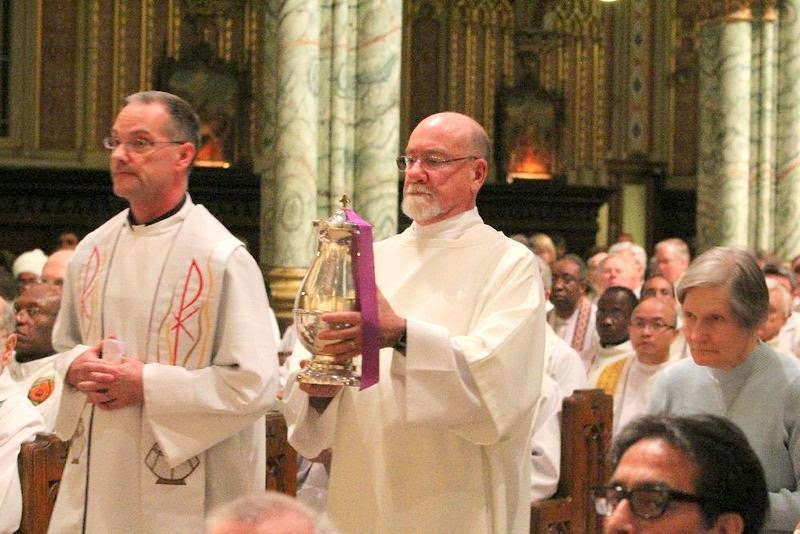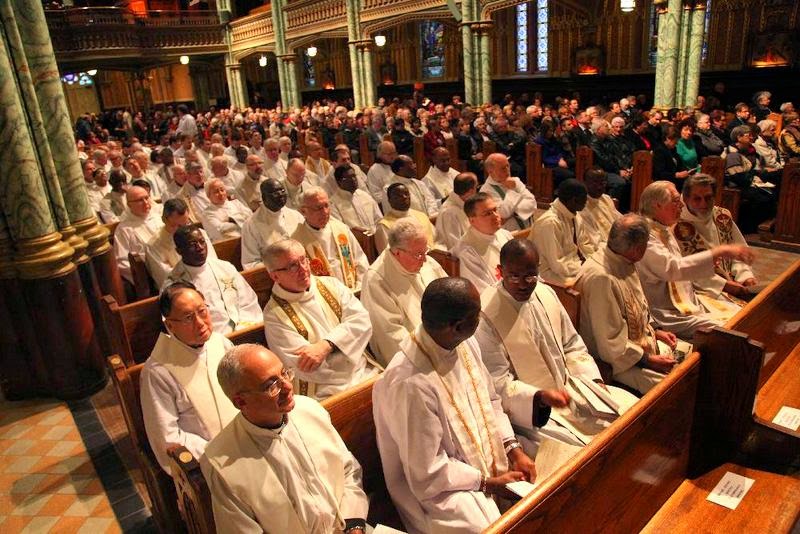Je suis heureux de vous accueillir à la Messe chrismale, une des célébrations les plus solennelles et des plus signifiantes dans la vie de l’Église. Durant cette célébration, nous consacrerons les huiles qui nous aideront à révéler l’amour de Dieu au monde; les prêtres renouvelleront les promesses qu’ils ont faites lorsqu’ils ont été ordonnés prêtres; et nous célébrerons notre unité alors que nous sommes rassemblés en Église diocésaine.
Je tiens d’abords à saluer chacun et chacune de vous qui êtes venus des quatre coins de l’archidiocèse : prêtres, diacres, religieux et religieuses, personnes consacrées et fidèles laïques.
Je tiens également à saluer particulièrement Mgr Luigi Bonazzi, nonce apostolique au Canada, grâce à qui nous sommes bien en lien avec le pape François, de même qu’à Mgr Christian Riesbeck, qui a été récemment ordonné et nommé évêque auxiliaire à Ottawa, ainsi qu’à tous les prêtres jubilaires fêtant du 25e jusqu’au 65e anniversaire d’ordination et qui sont avec nous ce soir.
Comme je le disais précédemment, durant cette célébration, je bénirai les saintes huiles qui serviront partout dans l’archidiocèse durant l’année qui vient. Ces huiles seront remises aux représentants des diverses paroisses et des diverses communautés de foi avant la bénédiction finale de ce soir.
L’huile qui sera versée dans l’ampoule marquée OC (oleum catechumenorum) servira à l’onction des enfants et des catéchumènes avant le baptême.
L’huile qui sera versée dans l’ampoule marquée OI (oleum infirmorum) servira à l’onction des malades des personnes qui sont sérieusement malades – avant ou après leur entrée à l’hôpital-, de même que des personnes dont la santé est fragile, qu’elles résident à la maison, dans une résidence pour personnes âgées ou autres établissements semblables.
Le saint-chrême sera versé dans la troisième ampoule – celle marquée SC (sacrum chrisma). Cette huile est utilisée par les ministres ordonnés lors du baptême, dans la Confirmation, dans l’Ordination des prêtres et des évêques, de même que pour consécration des autels et des églises.
Rendons grâce à Dieu pour les nombreux bienfaits qu’il nous accorde à travers les sacrements de l’Église, qui sont autant de signes de son salut. En ce jour, alors que nous vivons le mystère pascal, reconnaissons nos fautes et demandons au Seigneur de nous accorder sa miséricorde et de nos donner sa paix.
* * * * *
Notre Dame Cathedral Basilica—Ottawa:
“WE ARE THE AROMA OF CHRIST”
[Texts: Isaiah 61.1-3, 6, 8-9 [Psalm 89]; Revelation 1.5-8; Luke 4.16-21]
Dear brothers and sisters in Christ,
A few weeks ago, Bishop Riesbeck mentioned that he had left the chrism poured on his head at his episcopal ordination overnight and had noticed the sweet smell of the holy oil as he fell asleep. Sometimes after their Confirmation, children will remark that they have noticed the perfume in the chrism.
You see, to the olive oil that is the base of sacred chrism is added a spicy perfume, generally balsam, which graces the air with a sweet scent. This fragrance gets into one’s pores and, like the oil used to anoint Jesus before his death, it can fill a room or a house (John 12.3b).
Saint Paul in writing to the Corinthians says that we who have been anointed as Christians are called to be “the aroma of Christ” to the people around us: “We are the aroma of Christ to God among those who are being saved and among those who are perishing; to the one a fragrance from death to death, to the other a fragrance from life to life” (2 Corinthians 2.15-16a).
The metaphor of the Christian apostle as an “odor” or “fragrance” conveys the wafting of incense (which we use several times at Mass to reverence Christ, the altar; Christ God’s word; and Christ our sacrifice). Paul says that his way of giving himself in love for the sake of others—as we priests are called to do—reveals Jesus to those around him.
Paul associates the priestly life with an aroma or fragrance also in his letter to the Philippians where he says that the generous monetary offering the faithful made to his apostolic service was a sacrifice pleasing to God (Philippians 4.18). In his letter to the Ephesians, Paul says that the Messiah Jesus was a fragrant offering and sacrifice to God because he gave himself in love for the sake of others (Ephesians 5.2).
 |
With the metaphor of being a fragrance, Paul says that he participates in and embodies Jesus’ self-giving love. In living this way, Paul makes Christ known. Paul, and by extension all Christians, are like crushed, burning grains of incense: they make Jesus present in the world such that others can sense him and be attracted to him. This is the case because the risen Jesus is actually present within them.
Paul says the presence of the aroma of Christ in the world has two opposite effects. He says that among those perishing, Paul’s way of being an apostle wafts like an odor of death. Such people interpret the Christian way of life as folly and weakness; they fail to recognize the significance of the cross of Christ. On the other hand, among those being saved, Paul’s way of life wafts like the odor of life. That is, they grasp that the apostolic way of living shows forth the paradoxical life and power of Christ. Choosing to follow Jesus is the way to eternal life.
In the reading from the Book of Revelation, we are reminded that Jesus died for our sins out of love for us and to make us a church of holiness, a royal, priestly people, something we cannot achieve on our own.
Jesus Christ, the faithful witness, the First-born from the dead and the ruler of the kings of the earth ... loves us and washed us from our sins by his blood.
Though we are tainted by the residue of sin, we encounter the reconciling love of God made manifest in the sacramental life of our church. We clergy, religious and laity are called to maintain integrity of life in all that we are and in all that we do. In effect we are to show that we are on the way to living in holiness of life. Of ourselves none of us is up to this challenge, but with God’s grace great things are possible.
Since the bishop is the only minister in the diocese who may consecrate chrism, this Mass highlights his ministry and the union of all the faith communities with him. Though he cannot baptize and confirm all the candidates for these sacraments in all the parishes of the diocese, there is a sense in which the Apostle of the local church becomes symbolically present in the chrism which the priests and deacons use.
This Mass of Chrism recognizes the ministry of priests. In a few moments, I will invite the members of the presbyterate of Ottawa
For all of us long to know the joy that the people of Nazareth
Let us pray that every priest may know how to communicate the Lord's joy to those who come not only to be set free of their burdens but to discern how the Lord is calling the zealous and faithful Catholics of our Church of Ottawa to grow in the holiness proper to each one’s state of life.
Let us commend to the Lord our retired priests—especially the ill and infirm—that they may know spiritual consolation.
This evening we recall that, since our celebration of the Chrism Mass last year, the Lord has called to himself two priests who served the francophone sector of our diocese with distinction, Msgr. Paul Racine and the Marist priest, père Pierre Allard. We recall also the deaths in our diaconal families: Deacon Valmont Berubé of the French sector, and Deacons Kenneth Davies and Edward Webster of the English Sector. May the Lord grant to these servants of his the fullness of eternal life.
On Sunday, the universal church observed the Twenty-ninth World Youth Day. This year, the Archdiocese of Quebec is preparing the “Youth Summit /Montée Jeunesse”, dedicated to affirming youth, encouraging initiatives and sustaining youth-friendly parishes and to honouring our newly-canonized Saint Francois de Laval and Sainte Marie de l’Incarnation. We accompany the youth who will attend with our prayer and assure them that their gifts are important to the life of our diocesan church.
Please join with me in begging the Lord of the harvest for generous young men and women who will hear and answer the call to serve God's people as priests and religious.
In this period when the Church is preparing two synods of bishops to consider the challenges faced by married people and their families—especially those who have known separation, divorce, remarriage, blended families—we pray that our archdiocese may see a flourishing of men and women witnessing to their commitment to Christ in good marriages, and women and men living dedicated, faith-filled lives as single persons, becoming a blessing to the church and the world.
May I close my remarks by commending to your prayers during the Easter season a petition to Our Blessed Mother Mary, the Mother of Priests? That by her intercession she may obtain from her Son, the Risen Lord Jesus, the grace that our weak and timid spirits may become strong and joyful ones, to the praise and glory of God.













Has God sent a prophet? www.thewarningsecondcoming.com
ReplyDeleteBe sure to read about the “Seal of the Living God” found on the homepage links - *a Biblical reference to this topic: Rev. chapter 7